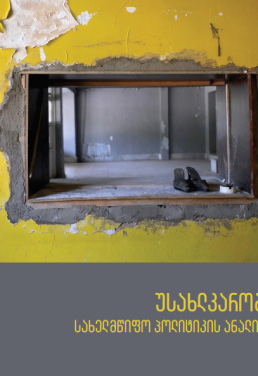საერთო ცხელი ხაზი +995 577 07 05 63


Homelessness and housing exclusion represent an important problem in Georgia. However, this issue is being inadequately recognized within political and social spaces.
Despite the acuteness of the problem, the needs of homeless individuals and the forms and reasons of homelessness or housing exclusion remain unstudied. To date, the number of homeless individuals has not been recorded and there is no relevant database. In addition, no research has been conducted on the scope of the problem of housing exclusion nor the increasingly severe situation of homeless persons
Due to inadequate recognition of homelessness as a problem and its exclusion from the political agenda, research on the problem of homelessness or housing exclusion in Georgia is related to significant complications[1]. The grave social and economic conditions of homeless groups, insufficient access among them to different rights, low levels of political participation and the absence of self-organization, complicates the public articulation of their needs and requirements, making the problems of homelessness even more invisible and indefinitely delaying the preparation of bases for their resolution.
Considering these and other challenges, and the systemic nature of the existing problems, the goal of the presented research is to study the law, institutional frameowrk, state policies and the housing services; additionally, the goal of the research is to study existing forms of homelessness and housing exclusion, the scope of social exclusion of persons living in these conditions, causes leading to the condition of homelessness and the capabilities of homeless groups. In order to transform the data into an effective, reactive and simultaneously preventive normative model, the document tries to answer the following questions: what forms does homelessness or condition of housing exclusion manifest in, how long do people live in this condition and what leads to homelessness.
Through the analysis of the existing context and the best international practices against homelessness, the research approximates discussions on housing needs to social needs (related to poverty, gender inequality, disability, etc.). In line with previous studies, the given document discusses dimensions of material, immaterial, economic and social conditions, in this case specifically applied on homelessness, and the dynamics between them.
The research is organized into two parts and ten chapters. The first part assesses policies, laws and institutional frameworks aimed at homelessness. The second part is a qualitative study of homeless groups. The first chapter of the first part describes research methodology; the second chapter reviews the state policies and the institutional framework aimed at eradicating homelessness; the third chapter analysis the definition of a homeless persona and the forms of homelessness recognized by the state; chapter four studies the services aimed at eradicating homelessnes, while the fifth chapter conveys the major findings.
The second part of the research is organized into five main chapters. Chapter One describes research methodology. Chapter Two discusses different forms of homelessness and housing exclusion and the factors leading to the social exclusion of the groups falling under the mentioned categories, in order to understand their capabilities. Chapter Three includes information about the duration of homelessness or housing exclusion, which leads to the possibility of discussing different degrees of social exclusion among homeless persons or persons facing housing exclusion. Chapter Four discusses different levels of processes leading to homelessness or housing exclusion. Chapter Five summarizes the main findings of the research and, based on these findings, discusses and substantiates the need of changing the approach towards certain target groups in order to improve, change and prevent their situation.
[1] Few of the important researches and reports, in this respect, are: Social Housing – Georgian Reality in International Context, 2013. Authored by: Vladimer Vardosanidze and Elene Darjania; Right to Adequate Housing – Special Report, 2015. Public Defender’s Office; Non-recognition, Inactivity and Repression Substituting a Home , 2014. Human Rights Education and Monitoring Center (EMC);
The website accessibility instruction